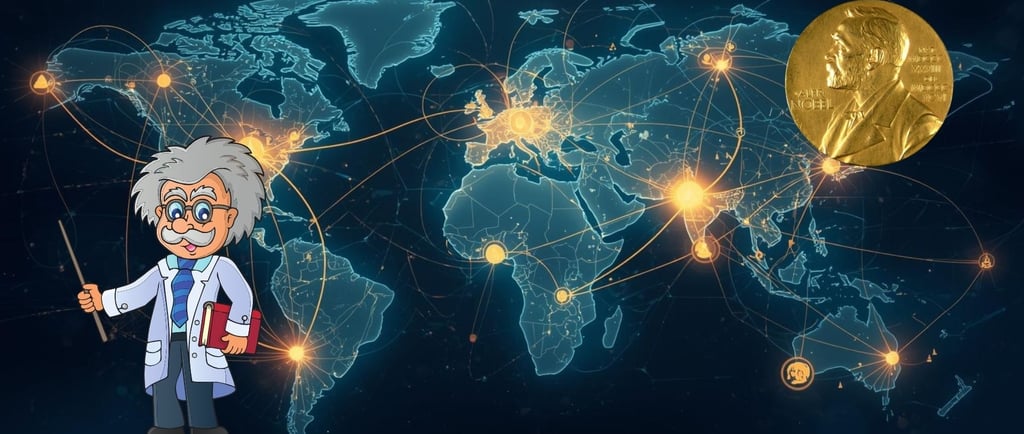The Global Journey of Nobel Laureates: How Migration Shapes Modern Science
Discover how more than 30% of this century’s Nobel laureates in science are immigrants, and what their journeys reveal about global collaboration, innovation, and the impact of restrictive policies on scientific progress.
RESEARCH & INNOVATIONCAREERS & OPPORTUNITIES
Dr. Mainak Mukhopadhyay
10/12/20253 min read


Each October, when the Nobel Prizes are announced, the world celebrates the brilliance of human discovery. But behind many of these triumphs lies a shared and often overlooked story — the story of migration.
According to a recent Nature analysis published in October 2025, more than 30 percent of science Nobel laureates (in physics, chemistry, and medicine) this century were immigrants — scientists who were born in one country but conducted their award-winning work in another. (Nature article link)
This finding highlights an essential truth about science today: great ideas know no borders.
Science in Motion: What the Data Show
Between 2000 and 2024, Nature tracked 202 Nobel laureates in the natural sciences. The results are eye-opening:
63 laureates had migrated before winning their prizes.
Less than 70 % of all laureates worked in the same country where they were born.
The United States emerged as the most frequent destination for laureates, followed by several European and Asian nations that host globally connected research hubs.
Some scientists even crossed borders more than once, reflecting the increasingly international nature of research careers.
In short, the Nobel story is a global story.
Why Do Scientists Move?
Migration among scientists is not random. It is often a response to opportunity — the search for better tools, greater freedom, and intellectual community. Here are some of the main forces that drive this movement:
1. Access to Research Infrastructure
World-class laboratories, advanced instruments, and steady research funding are essential for cutting-edge discoveries. Many scientists relocate to places that offer these critical supports.
2. Collaboration and Networks
Modern science thrives on collaboration. Working close to other leading minds, whether in Boston, Berlin, or Beijing, accelerates both innovation and visibility.
3. Academic Freedom and Support
Environments that allow open inquiry, experimentation, and debate tend to produce bold and creative research — the kind that changes paradigms and earns Nobel recognition.
4. Career Opportunities
Migration often aligns with the professional journey — postdoctoral fellowships, faculty positions, or invitations to join prestigious institutions that expand a scientist’s potential.
Migration Data and Policy Paradox: Lessons from the Trump Era
The Nature analysis underscores how much global mobility fuels discovery — yet U.S. policy has not always reflected this reality.
During the Trump administration, visa restrictions, higher fees, and unpredictable immigration rules created barriers for international researchers and students. Policies such as tightened H-1B visa criteria, travel bans affecting multiple countries, and new fees for sponsoring international scholars discouraged many from coming — even though the United States remains the most common destination for future Nobel-level scientists.
This created a policy paradox: the very nation that benefits most from immigrant innovation risked weakening its own scientific foundation. Restrictive immigration policies may appear to protect domestic opportunities, but in practice, they slow down discovery, collaboration, and the inflow of global expertise that has historically powered U.S. scientific leadership.
Scientific progress thrives on openness. As the Nature report shows, over 30 % of this century’s top scientists have already crossed borders to pursue excellence. Any policy that narrows those borders ultimately narrows the horizons of science itself.
The Global Balance: Brain Drain or Brain Circulation?
When scientists migrate, countries experience both gains and losses.
Brain Drain: Nations that invest in early education and training sometimes see their brightest minds leave for better-resourced regions.
Brain Gain: Host countries benefit from the influx of global talent, gaining diversity of ideas and expertise.
Brain Circulation: Increasingly, scientists collaborate across borders or return home later in their careers, creating a dynamic global exchange.
Rather than a one-way flow, scientific migration today resembles a network of interconnected hubs, constantly sharing ideas, skills, and discoveries.
A Borderless Vision of Science
The Nobel data remind us that science flourishes where curiosity is welcomed, collaboration is possible, and opportunity is open. National borders may define citizenship, but the pursuit of knowledge belongs to humanity as a whole.
In an era when migration and globalization are often politically charged topics, the lives of Nobel laureates offer a hopeful message: when nations support openness, education, and scientific exchange, everyone benefits.
Looking Ahead
As global challenges — from climate change to pandemics — demand collective innovation, nurturing the mobility of knowledge is more important than ever.
Encouraging international cooperation, supporting immigrant scientists, and building bridges between institutions can ensure that the next generation of discoveries continues to cross borders as freely as ideas themselves.
Because, in the end, science is not about where you were born — it’s about where your curiosity takes you.
Reference
Ahart, J. (2025, October 9). More than 30% of this century’s science Nobel prizewinners immigrated: see their journeys. Nature. https://www.nature.com/articles/d41586-025-03247-6
Author Details
Dr. Mainak Mukhopadhyay
Associate Professor
Department of Biosciences
JIS University, Kolkata
(Ph.D. from Indian Institute of Technology Kharagpur, 2014)
Google Scholar Profile: https://scholar.google.com/citations?user=7mKAs4UAAAAJ&hl=en
Explore
Stay updated with biotech insights and research.
Connect
Discover
m.mukhopadhyay1212@gmail.com
+91-8777294577
© 2025. All rights reserved.